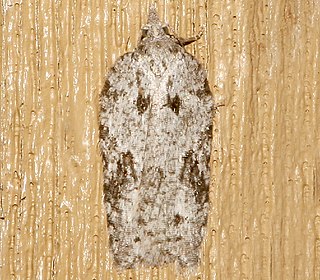
Sparganothis is a genus of moths belonging to the subfamily Tortricinae of the family Tortricidae.
Coleophora kearfottella is a moth of the family Coleophoridae first described by William Barnes and August Busck in 1920. It is found in North America, including New Jersey, Ontario, Quebec and Prince Edward Island.

Stagmatophora wyattella, or Wyatt's stagmatophora moth, is a moth in the family Cosmopterigidae. The species was first described by William Barnes and August Busck in 1920. It is found in the US states of Maine, Ohio, Iowa, Kentucky, Michigan, Mississippi and Oklahoma.
Sparganothoides machimiana is a species of moth of the family Tortricidae described by William Barnes and August Busck in 1920. It is found from the mountains and woodlands of Arizona, Colorado and New Mexico in the United States south to Durango in Mexico. The habitat consists of mixed forests and oak woodlands.
Platynota viridana is a species of moth of the family Tortricidae first described by William Barnes and August Busck in. It is found in the United States in Arizona, Texas and South Carolina.
Dorithia peroneana is a species of moth of the family Tortricidae first described by William Barnes and August Busck in 1920. It is found in the US state of Arizona.

Phalonidia lavana, or Platphalonidia lavana, is a species of moth of the family Tortricidae, the subfamily Tortricinae, and the tribe Cochylini. It has a terrestrial habitat and is found throughout North America. It does not have a Global Conservation Status Rank.
Phtheochroa perspicuana is a species of moth of the family Tortricidae first described by William Barnes and August Busck in 1920. It is found in the United States, where it has been recorded from Arizona and Texas.
Choristoneura carnana is a species of moth of the family Tortricidae first described by William Barnes and August Busck in 1920. It is found in the United States, where it has been recorded from California and Colorado.

Acleris maximana is a species of moth of the family Tortricidae first described by William Barnes and August Busck in 1920. It is found in North America, where it has been recorded from Alberta, British Columbia, California, Maryland, Massachusetts, Michigan, Montana, New Brunswick, North Carolina, Ontario, Pennsylvania, Saskatchewan, Tennessee, Utah and Washington.
Acleris stadiana is a species of moth of the family Tortricidae first described by William Barnes and August Busck in 1920. It is found in North America, where it has been recorded from Ontario.
Agonopterix latipalpella is a moth in the family Depressariidae. It was described by William Barnes and August Busck in 1920. It is found in North America, where it has been recorded from Texas.
Chionodes psiloptera is a moth in the family Gelechiidae first described by William Barnes and August Busck in 1920. It is found in North America, where it has been recorded from Quebec to British Columbia and then to Alaska, eastern Washington, Montana and New York.
Chionodes retiniella is a moth in the family Gelechiidae first described by William Barnes and August Busck in 1920. It is found in North America, where it has been recorded from Idaho, Wyoming, Nevada, British Columbia, Washington, Colorado, New Mexico, Arizona and California.
Chionodes xanthophilella is a moth in the family Gelechiidae first described by William Barnes and August Busck in 1920. It is found in North America, where it has been recorded from California, Arizona, Nevada, New Mexico, Texas and North Dakota.
Coleotechnites elucidella is a moth of the family Gelechiidae described by William Barnes and August Busck in 1920. It is found in North America, where it has been recorded from California.

Teleiopsis baldiana is a moth of the family Gelechiidae described by William Barnes and August Busck in 1920. It is found in North America, where it has been recorded from California.
Gelechia benitella is a moth of the family Gelechiidae described by William Barnes and August Busck in 1920. It is found in North America, where it has been recorded from Texas.
Prolita rectistrigella is a moth of the family Gelechiidae. It was described by William Barnes and August Busck in 1920. It is found in North America, where it has been recorded from California, Arizona, New Mexico, Colorado, Utah, Wyoming, Montana, Washington and Alberta.
Antaeotricha lindseyi is a moth in the family Depressariidae. It was described by William Barnes and August Busck in 1920. It is found in North America, where it has been recorded from California, Arizona and New Mexico.




